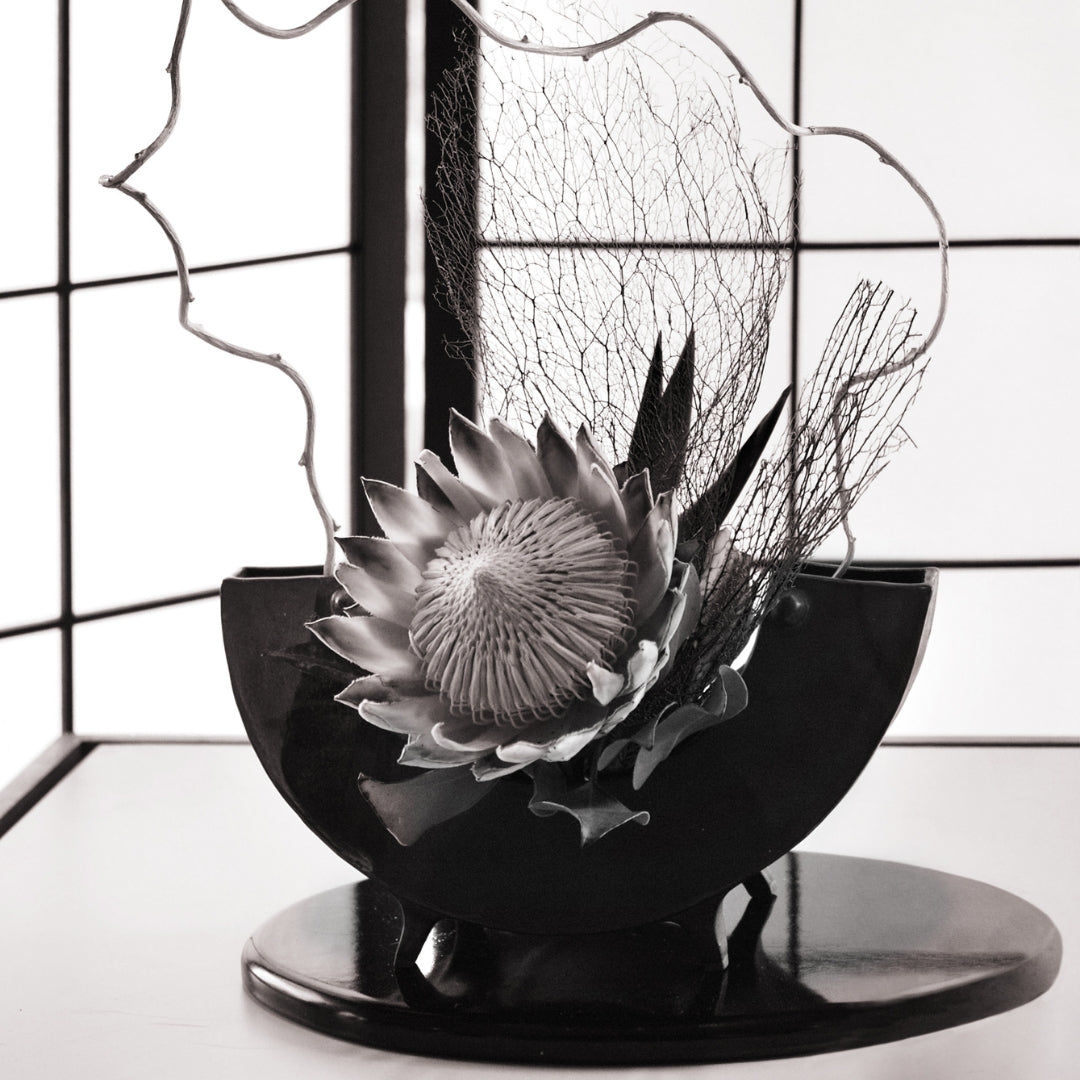Article: Ikebana: Japanese floral art

Ikebana: Japanese floral art
Ikebana, an ancient Japanese floral art, transcends the simple arrangement of flowers to become a profound and delicate artistic expression. Much more than a simple floral decoration, Ikebana is a visual meditation, an intimate dialogue between man and nature which invites contemplation and simplicity.
Originating in Japan, Ikebana finds its roots in Buddhist ritual and spiritual practices, as well as in the floral offerings of Shinto shrines. This form of floral art has developed over the centuries to become a true discipline, characterized by strict rules and a deep philosophy.
Ikebana is distinguished by its minimalist and balanced approach, seeking to capture the very essence of the ephemeral beauty of flowers. Each floral arrangement is carefully considered, with each stem and leaf placed with special intention. It is not just about creating an arrangement that is pleasing to the eye, but rather about transmitting a message, reflecting the harmony between man, nature and the universe.
In Ikebana, space is just as important as the floral elements themselves. The voids are considered integral parts of the composition, creating a dynamic between full and empty, symbolizing the passing of time and the impermanent nature of life.
The three fundamental principles of Ikebana, called "Shin" (truth), "So" (beauty) and "Hikari" (light), guide the practitioner throughout the creative process. Each of these principles represents a different dimension of the human experience and relationship with nature.
Ikebana transcends the simple act of arranging flowers in a vase. It is an invitation to slow down, to contemplate the fleeting beauty of nature and to recognize the transient but precious existence of each flower. By practicing Ikebana, we embrace simplicity, patience and gratitude towards the natural world around us.
Each floral arrangement thus becomes an ephemeral work of art, a moment frozen in time where the grace of flowers meets human sensitivity, recalling the fragility of life and the beauty that resides in each moment. Ikebana, much more than a floral technique, is a celebration of life itself.
Originating in Japan, Ikebana finds its roots in Buddhist ritual and spiritual practices, as well as in the floral offerings of Shinto shrines. This form of floral art has developed over the centuries to become a true discipline, characterized by strict rules and a deep philosophy.
Ikebana is distinguished by its minimalist and balanced approach, seeking to capture the very essence of the ephemeral beauty of flowers. Each floral arrangement is carefully considered, with each stem and leaf placed with special intention. It is not just about creating an arrangement that is pleasing to the eye, but rather about transmitting a message, reflecting the harmony between man, nature and the universe.
In Ikebana, space is just as important as the floral elements themselves. The voids are considered integral parts of the composition, creating a dynamic between full and empty, symbolizing the passing of time and the impermanent nature of life.
The three fundamental principles of Ikebana, called "Shin" (truth), "So" (beauty) and "Hikari" (light), guide the practitioner throughout the creative process. Each of these principles represents a different dimension of the human experience and relationship with nature.
Ikebana transcends the simple act of arranging flowers in a vase. It is an invitation to slow down, to contemplate the fleeting beauty of nature and to recognize the transient but precious existence of each flower. By practicing Ikebana, we embrace simplicity, patience and gratitude towards the natural world around us.
Each floral arrangement thus becomes an ephemeral work of art, a moment frozen in time where the grace of flowers meets human sensitivity, recalling the fragility of life and the beauty that resides in each moment. Ikebana, much more than a floral technique, is a celebration of life itself.

